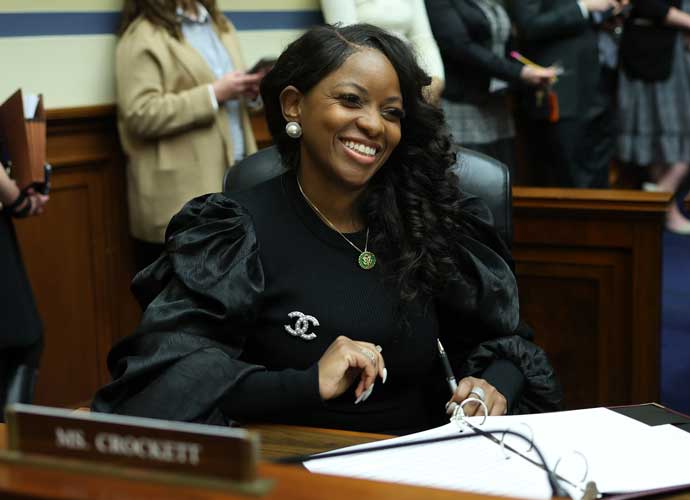Rep. Jasmine Crockett Bio: In Her Own Words – History, Career, Policies
Rep. Jasmine Crockett (D-Texas) was born in St. Louis, Missouri, in 1981. Her father is a teacher and preacher, and her mother has worked for the United States Postal Service for more than 40 years. From an early age, her parents instilled in her the value of serving the community.
Rep. Jasmine Crockett Bio: Early Life & Education
Crockett attended Rhodes College and earned an undergraduate degree in Business. She decided to attend law school shortly after graduating from Rhodes and earned a Juris Doctor from the University of Houston Law Center.
Rep. Jasmine Crockett Bio: Early Legal Career
Following her graduation from law school, Crockett remained in Texas and worked as a civil rights attorney. She first worked as a public defender for Bowie County and then opened her own civil rights, criminal defense and personal injury law firm. Crockett worked on many high-profile cases, focusing on defending Texans who faced racial injustice and brutality. She is the former president of the Dallas Black Criminal Bar Association and has held many leadership positions within the legal community.
Subscribe to our free weekly newsletter!
A week of political news in your in-box.
We find the news you need to know, so you don't have to.
Rep. Jasmine Crockett Bio: Entrance Into Politics
In an exclusive interview with uPolitics, Crockett shared that she decided to enter politics because of “frustration.”
“For me, it was waking up and having to defend people consistently in a state and finding inconsistencies amongst the counties, and seeing that the system just wasn’t fair,” said Crockett on her decision to run for Texas state House. “I just felt like I wasn’t doing enough, I felt like my law degree was not going as far as it could. I felt like they needed someone that actually understood how these laws were affecting people in real-time and not hypothesizing or pontificating about how these laws worked, but had actually lived it.”
After state Rep. Eric Johnson gave up his seat in the Texas House of Representatives in 2019, a special election was held for the remainder of his term. Upon Lorraine Birabil’s victory in this election, Crockett announced that she would challenge Birabil in the 2020 Democratic primary. She advanced to the general election and won, assuming office in January 2021.
Crockett was the youngest black member and only black freshman during the 87th Legislative Session. Her work in the Texas House has earned her various awards and recognitions, including a spot on the 2021 The Root 100 List of Most Influential African Americans.
Rep. Jasmine Crockett Bio: House of Representatives, Record Policies, Bills
When former U.S. Rep. Eddie Bernice Johnson (D) announced her retirement in 2022, she called upon Crockett to fill her seat.
“After serving my one term, my Congresswoman, who was a tender 87, called me and said it was time for her to retire,” said Crockett about Johnson. “She thought that I should be the one to run and replace her… She stood with me throughout the entire election, and we were successful.”
Crockett won the general election in November 2022 and thus took office in January 2023 to represent Texas’ 30th congressional district in the U.S. House of Representatives.
Crockett is currently fighting for pro-choice, pro-gun restriction and pro-LGBTQ legislation. She is specifically championing the Bipartisan Secure Resources Instead of Prosecuting (STRIP) Act, which would exempt the possession, sale or purchase of fentanyl testing equipment from the federal drug paraphernalia law.
“We are trying to decriminalize fentanyl testing strips so that they are not considered paraphernalia and people could test the drugs that they are using,” Crockett said in an interview with uPolitics. “I look at addiction as an illness, we need to treat the root causes of the illness and make sure that we are saving lives. Punishing the people that are peddling drugs is clearly not deterring them, so increasing the penalties is not going to save lives. I think that this is a smart piece of legislation.”
Transcription of interview with uPolitics founder Erik Meers:
EM: We love to hear a little bit about the personal stories of the people we interview. I know you started as a lawyer, what made you decide you wanted to get into politics?
JC: It was just frustration. Some people wake up and know on day one that they want to go into politics. They were political science majors or they had family members in politics, there’s always a political dynasty that you can find somewhere. And then there are those of us who wake up one day and something has motivated us. For some, it has been some radical movement, as we know with Maxwell Frost, who became an activist as it relates to guns.
For me, it was waking up and having to defend people consistently in a state and finding inconsistencies amongst the counties, and seeing that the system just wasn’t fair. I wanted to create a more fair system. In addition to that, working as a civil rights lawyer and getting poured out of court because seemingly all the protections lay with the police departments. You had people that lost their loved ones for no good reason. The very people that were supposed to protect them, killed them. And then, the ultimate protection still didn’t lie with them even in death, it still really lay with law enforcement.
I just felt like I wasn’t doing enough, I felt like my law degree was not going as far as it could. I felt like they needed someone that actually understood how these laws were affecting people in real-time and not hypothesizing or pontificating about how these laws worked, but had actually lived this, had actually experienced the death of clients in custody, and the death of folks that were just riding as a passenger in their car. And even saw a 17-year-old who was incarcerated for two years for stealing candy out of the concession stand at his high school and it was considered a felony.
I feel like they needed someone who had real-life experiences with these laws and could talk about them, explain them and fix them. Little did I know that they didn’t really want fixing. I was green, I was really believing that once I got there and told them about these experiences, we could really make progress. I quickly adjusted and started to go on the offensive, attacking them for their hypocritical stances. I did that in the state House and, seemingly, I’ll have to do a decent amount of that in D.C., as well.
It was basically just frustration that led me to run for the state House and then ultimately, after serving my one term, my Congresswoman, who was a tender 87, called me and said it was time for her to retire. She thought that I should be the one to run and replace her and I thought she was punking me, I was looking for the cameras. She had been retiring for about a decade and had never really pulled the trigger, but did this time. She stood with me throughout the entire election, and we were successful.
Get the most-revealing celebrity conversations with the uInterview podcast!









Leave a comment